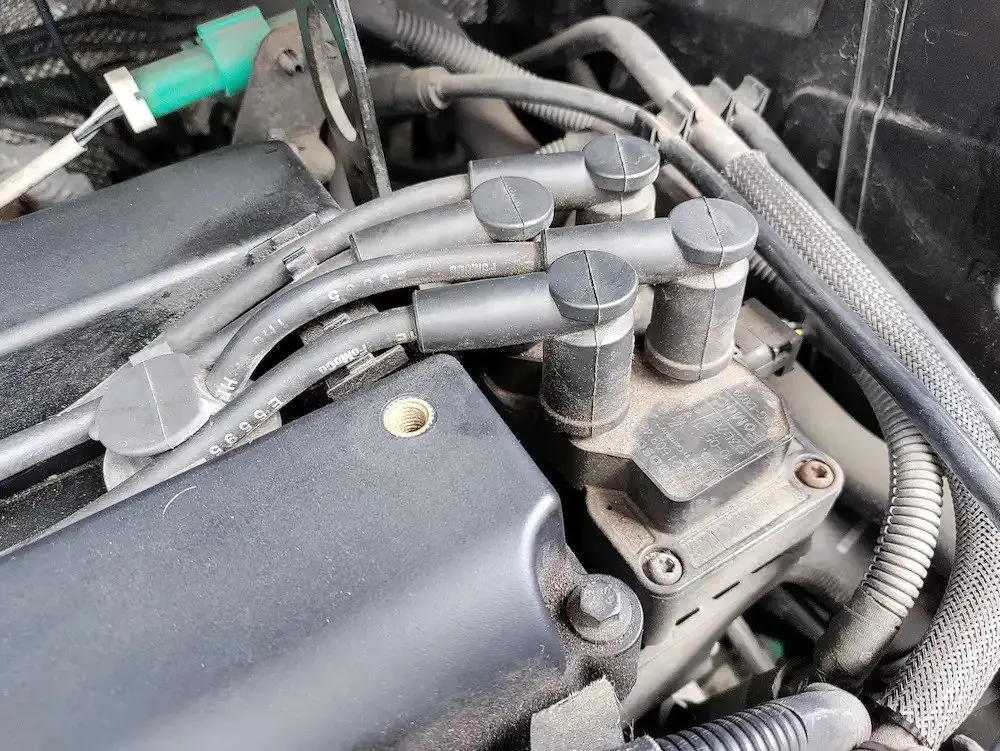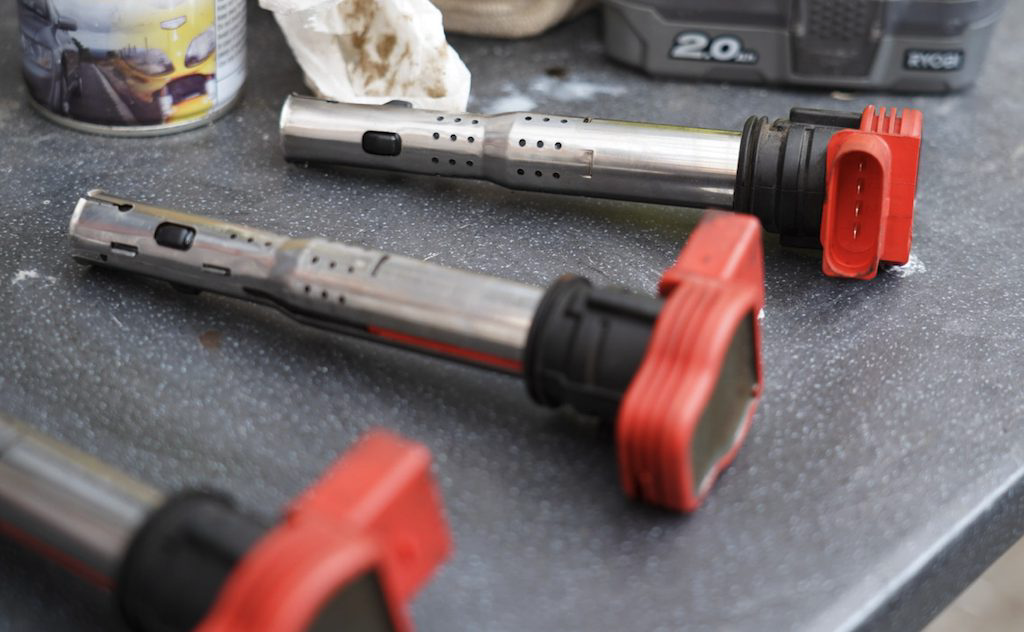Here are some insights into how long can I drive with a bad ignition coil…
- What Are The Signs?
- What Are The Causes?
- How Do You Diagnose?
- What Are The Symptoms?
- How Much Does It Cost?
- Is It Safe To Drive?
What Are the Signs of a Bad Ignition Coil?
A bad ignition coil can cause a variety of symptoms, including engine misfires, rough idling, stalling, reduced fuel economy, and an illuminated check engine light. Other signs of a faulty ignition coil include backfiring, difficulty starting the vehicle, and decreased power and acceleration. In some cases, a bad ignition coil may also produce a strange smell or make abnormal noises.
If you suspect that your vehicle’s ignition coil is failing or has failed completely, it is important to have it inspected by a qualified mechanic as soon as possible. Ignition coils are essential components in the operation of your vehicle’s engine and should be replaced if they are not functioning properly.
How Long Can You Drive With a Faulty Ignition Coil?
It is not recommended to drive a vehicle with a faulty ignition coil or a bad coil pack for any length of time. Ignition coils are responsible for providing the spark that ignites the air-fuel mixture in the combustion chamber, and without this spark, your engine will not run.
Driving with a faulty ignition coil can cause further damage to other components of your vehicle, such as the catalytic converter or oxygen sensors. It can also lead to misfires and poor fuel economy. Therefore, it is best to have your ignition coil replaced as soon as possible if you suspect it is malfunctioning.
What Causes an Ignition Coil to Fail?
Ignition coils are an essential component of any vehicle’s ignition system, as they are responsible for converting the low voltage from the battery into thousands of volts needed to create a spark in the spark plugs. Unfortunately, these components can fail over time due to a variety of reasons.
The most common causes of ignition coil failure include excessive heat and vibration, faulty spark plugs or plug wires, moisture or oil contamination, and electrical overloads. Excessive heat is one of the most common causes of ignition coil failure.
When an engine runs too hot for too long, it can cause damage to the insulation on the windings inside the coil and lead to short circuits that will eventually cause it to fail. Vibration can also be damaging as it can cause physical wear and tear on internal components over time.
Faulty spark plugs or plug wires can also contribute to ignition coil failure by sending incorrect signals that put too much strain on them. Moisture or oil contamination is another issue that can lead to corrosion inside an ignition coil which will eventually cause it to fail prematurely.
Finally, electrical overloads caused by faulty wiring or other issues with your vehicle’s electrical system may also be responsible for causing your ignition coils to fail prematurely.
How Do You Diagnose a Bad Ignition Coil?
Diagnosing a bad ignition coil can be done by performing a few simple tests. You can find out more in our guide on how to test a coil pack without a multimeter.
- First, check the spark plug wires for any signs of wear or damage. If the wires are cracked or frayed, they should be replaced immediately as this could indicate a faulty ignition coil.
- Next, inspect the spark plugs for any signs of corrosion or damage. If there is visible corrosion on the spark plugs, it may be an indication that the ignition coil is not functioning properly and needs to be replaced.
- Finally, perform a visual inspection of the ignition coils themselves. Look for any signs of cracking or other physical damage that could indicate a malfunctioning part. If you notice anything out of place with your coils, it’s best to replace them as soon as possible to avoid further issues with your vehicle’s performance and safety.
If all else fails and you are still unsure if your ignition coils are functioning properly, it is best to take your vehicle to an auto repair shop where they can perform more detailed tests and inspections to accurately diagnose any potential problems with your car’s electrical system.
What Are the Symptoms of a Failing Ignition Coil?
The symptoms of a failing ignition coil can vary depending on the severity of the issue. Generally, common signs include engine misfires, difficulty starting the vehicle, and a decrease in fuel efficiency. Other symptoms may include backfiring, stalling or rough idling, and an illuminated check engine light.
In some cases, when it comes to the symptoms of a bad ignition coil, drivers may also notice a burning smell coming from their vehicle’s engine bay. If any of these symptoms are present it is important to have the ignition coil checked as soon as possible to prevent further damage to other components in the system.
How Much Does It Cost to Replace an Ignition Coil?
The cost of replacing an ignition coil can vary depending on the make and model of your vehicle. Generally, the cost for a single ignition coil replacement ranges from $80 to $400, with labor costs ranging from $50 to $200. The total ignition coil replacement cost will depend on the type of vehicle you have and whether or not you need to replace multiple coils.
It is important to note that some vehicles may require special tools or parts to complete the repair, which could increase the overall cost. Additionally, if you choose to have a professional mechanic perform the repair, they may charge additional fees for their services.
Is It Safe to Drive With a Faulty Ignition Coil?
No, it is not safe to drive with a faulty ignition coil. An ignition coil is an essential component of the vehicle’s ignition system, and when it fails, the engine will not start or run properly. A faulty ignition coil can cause misfires, poor fuel economy, stalling, and other issues that can affect the performance of your vehicle.
In some cases, a faulty ignition coil can even lead to engine damage if left unchecked for too long. Therefore, it is important to have any issues with your vehicle’s ignition system checked by a qualified mechanic as soon as possible to ensure the safe operation of your vehicle.
What Are the Benefits of Replacing Your Car’s Bad Ignition Coils Regularly?
Replacing your car’s bad ignition coils regularly can provide a number of benefits. Ignition coils are responsible for converting the low voltage from the battery into high voltage, which is then used to ignite the fuel and air mixture in the combustion chamber. When these coils become worn or damaged, they can cause a variety of issues with your vehicle’s performance.
- The most obvious benefit of replacing bad ignition coils is improved engine performance. Worn or damaged ignition coils can cause misfires, which will reduce power and efficiency as well as increase emissions. Replacing them regularly will ensure that your engine runs smoothly and efficiently, providing you with better fuel economy and fewer emissions.
- Another benefit of replacing bad ignition coils is increased reliability. Faulty ignition coils can lead to more frequent breakdowns due to their inability to generate enough spark for proper combustion. By replacing them regularly, you can avoid costly repairs caused by faulty components and ensure that your vehicle remains reliable for longer periods of time.
- Finally, regular replacement of bad ignition coils will help extend the life of other components in your vehicle’s engine such as spark plugs and oxygen sensors which rely on proper functioning from the coil to work properly themselves.
- This means that by replacing worn or damaged parts before they cause further damage you could save yourself money in repair costs down the line while also ensuring that all components are working together optimally for maximum efficiency and performance from your car’s engine overall.
How Can I Tell If My Car Has A Bad Ignition Coil Without Taking It To A Mechanic?
It is possible to determine if your car has a bad ignition coil without taking it to a mechanic. The most common symptom of a faulty ignition coil is engine misfiring, which can cause the vehicle to shake or vibrate. Additionally, you may notice that the engine runs rough or stalls when idling.
You may also experience difficulty starting the vehicle and/or reduced fuel efficiency. If any of these symptoms are present, it is likely that your car has a bad ignition coil and should be taken to a mechanic for further inspection and repair.
Should I Replace All My Car’s Bad Coils At Once or One at A Time?
It is generally recommended to replace all of your car’s bad coils at once rather than one at a time. This is because when one coil fails, it can cause additional strain on the other coils, leading to further damage and potentially more costly repairs. Additionally, replacing all of the coils at once ensures that they are all working in unison and will provide optimal performance for your vehicle.
When replacing multiple coils, it is important to ensure that you use parts from the same manufacturer and with the same specifications as those being replaced. This will help ensure that your car runs smoothly and efficiently after installation.
Additionally, if you are unsure about how to install new coils or do not have access to the necessary tools or equipment, it is best to consult a professional mechanic who can properly install them for you.


